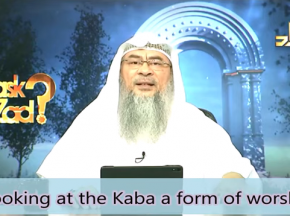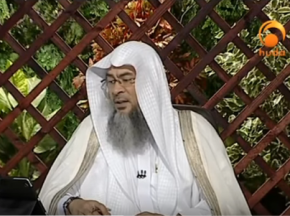content of level
Is it prohibited to look at the Kabah while doing tawaf?
Is it prohibited to look at the Kabah while doing tawaf?
What is the beginning and end time of Morning and Evening Supplications
What is the beginning and end time of Morning and Evening Supplications.
Is looking at the Kabah a form of worship?
Is looking at the Kabah a form of worship?
Can we recite Durood, Duas, Adkhar in the state of major sexual impurity?
Can we recite Durood, Duas, Adkhar in the state of major sexual impurity?
Do Muslims worship the Kabah?
Do Muslims worship the Kabah?
Need husband's permission or Father's permission to go out before consummating marriage?
Need husband's permission or Father's permission to go out before consummating marriage?
Naming a child in Islam
Naming a child in Islam: Can we give 2 names, Can a child be named after his Mother?
Is your dua accepted when you see the Kabah for the first time and make dua?
Is your dua accepted when you see the Kabah for the first time and make dua?
When a pilgrim comes back from Hajj?
When a pilgrim comes back from Hajj, is his dua answered for 40 days?
Islamic Fiqh
Your easy way to learn about the rules of Islamic Fiqh Register in the Islamic jurisprudence platform to be able to pass the levels after a wonderful educational experience. Collect your points and get a number of medals and a certificate.
How to wipe inner & outer ear in wudu
How to wipe inner & outer ear in wudu & Must water reach scalp & roots when wiping head.
Can we split the prescribed adkar and say it throughout the day or should we say it in one go
Can we split the prescribed adkar and say it throughout the day or should we say it in one go.
How can a Muslim Woman serve Islam?
How can a Muslim Woman serve Islam?
Can a man marry a wealthy woman to support him financially?
Can a man marry a wealthy woman to support him financially?
Combining Prayers due to hardship
Combining Prayers due to hardship: Exams, Surgery, Doctors.
I tell my daughter to offer Prayers but she does not listen to me, What should I do
I tell my daughter to offer Prayers but she does not listen to me, What should I do- Assim al hakeem.
Hair fibers (Powder that connects to the hair), does it affect wudu and ghusl?
Hair fibers (Powder that connects to the hair), does it affect wudu and ghusl?
What is a Sutra and how high should a Sutra be?
What is a Sutra and how high should a Sutra be?
Is it true that Allah loves us 70 times more than our mothers?
Is it true that Allah loves us 70 times more than our mothers?
Is my Wudu and Ghusl valid if I apply Hair Gel?
Is my Wudu and Ghusl valid if I apply Hair Gel?




















